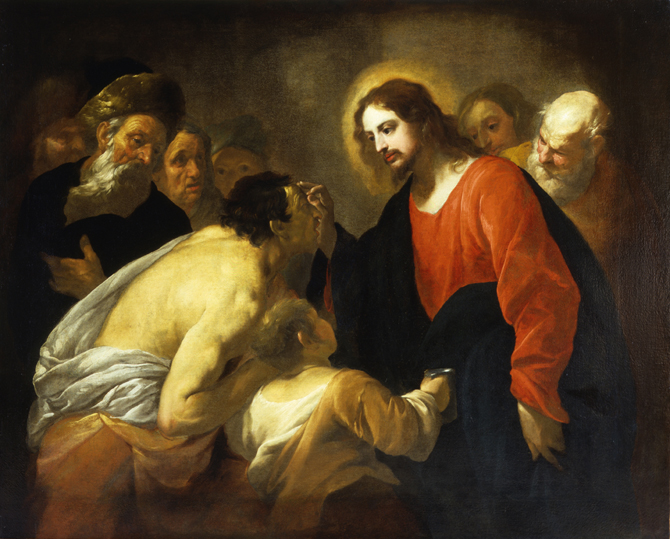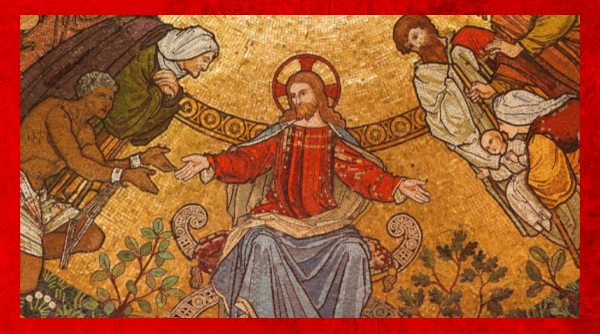With eyes of hope

Jesus, Son of David, have mercy on me! (Mark 10:47)
With addictions skyrocketing in the U.S., spiritual directors need be alert to the impact of addiction upon the soul in order to guide the directee in their relationship with our Lord. The most devastating of these can be pornography due to its nature and its action in the faculties of the soul.
A particular aspect of porn that differentiates it from other addictive substances is where the activity resides in the person after its use. While all addictions effect both body and mind, food, alcohol, and drugs enter through and remain in the body (with secondary effects on the psyche). By abstaining from ‘occasions of sin’, a person can limit their physical exposure to stimulation that would tempt engaging in the addictive substance.
Porn, however, is taken in through the eyes directly into the mind and resides there, specifically the images in the memory where the imagination can continue to reuse them. Bodily effects are secondary. Not only can the initial experiences be repeated through recall, the imagination can use the images to create new experiences (i.e. day dreaming).
Understanding this through the anthropology of the human person, this ability of memory recall as well as to engage in fantasy (creation of new images using images already known) is part of what distinguishes the human soul from those of lower order creation. This repetition, whether by using porn or by imagining it with one’s own memories, forms the appetites into a heightened state of seeking this pleasure. “The imagination also has a great influence over the sensitive appetite” explains Jordan Aumann, “which is moved with great force … when the imagination clothes it with special attractiveness” (Aumann, 2006, p. 181). Having determined this object (porn) to be ‘good’, the person wills the intellect (which seeks truth and deliberates best ways to find it) to rationalize and find ways to engage with it. Being led to believe that these false goods are true then malforms the conscience.
While use of porn can be avoided, one cannot press ‘delete’ from their memory to escape it. And just like any addiction, it usually takes an increasing amount of the substance to achieve the same results. Addicts begin to desire more in order to achieve the same satisfactory effects. With porn, this need for increased stimulation not only leads to more frequent use of it but also to seeking greater intensity. The addict often engages in more violent forms of porn and the stimulation is continued by trying out the violent tactics in their own sexual activities. The faux sense of power and control also can lead them to taking risks such as saving porn images on their workplace devices, engaging sexual partners outside of their normal relations (e.g. coworkers, neighbors, prostitutes), or putting their sexual activities on the internet.
While all addictive substances elicit the passions and attack the appetites, porn goes further. It attacks our very sexuality, that which is beautiful about being male and female, reducing the user’s perspective of human persons to being mere objects that are to be used for pleasure. The porn user becomes increasingly blind to the basic dignity of every human person by nature of their God-given existence, particularly blind to his or her own dignity. For this reason, and distinct from other forms of addiction, porn is significantly connected with an increase of violence towards women and children.
Porn forms the person into the likeness of Satan. A very dark second persona seems to develop. Rather than being schizophrenic in nature, it is an interior duality as Satan’s presence grows in the faculties of the soul. The enemy cannot change our nature, but he can tempt and inspire us to vice and sin which augments the weaknesses that already exist. This is why we can see Christians who, although using porn, are able to externally present themselves as honorable, walking with the Lord. They are capable of both masterfully explaining the faith and engaging with its practices yet, at the same time, living a secret life steeped in porn and even porn-driven sexual escapades.
(Image: Orazio de Ferrari, Public domain, via Wikimedia Commons)
With Eyes of Hope
Part Two: Redemption and Restoration in Christ

Then the Lord will guide you always and satisfy your thirst in parched places, will give strength to your bones And you shall be like a watered garden, like a flowing spring whose waters never fail. (Isaiah 58:11)
Part one of this article series explained the unique nature of pornography as residing in the memory and imagination. This permits repeated engagement with porn through recall of images and past experiences, even without engaging in pornographic material itself. An interior duality forms in the person as Satan’s presence grows in the faculties of the soul.
For any addict, the addict ‘mentality’ or ‘personality’ develops in which the user protects and controls their ability to continue using. Lying and manipulating one’s circumstances are primary self-protection mechanisms that have formed the soul to continue these ‘default’ behaviors whether or not engaging in the addictive material. Thus, even after using the substance has ceased and the person is in recovery, the addict needs help to recognize and change these residual behaviors. Permanent change requires healing of the underlying wounds which led to these lifestyle choices and have kept them in addiction. Spiritual direction is a critical component of this recovery. The spiritual director guides the directee in their relationship with their Creator, particularly by helping them recognize God’s voice and action in their life. Through prayer, the directee comes to understand God’s desire for their relationship to be ‘up close’ and personal in every aspect of their life. By understanding God’s true nature and love for them, they come to knowledge of their own true identity. The likeness to Satan that was formed in them by following the devil’s lead slowly dissipates like sludge being washed away by a stream of pure water. The Holy Spirit cleanses their soul, and a true, in-tact self-image is restored. It isn’t that they gain a new identity. Rather, they experience the joy of discovering their true identity which has always existed, that made to Christ’s image. They are redeemed and restored.
Now those who belong to Christ Jesus have crucified their flesh with its passions and desires. (Galatians 5:24)
This restoration is centered in their coming to know their innate human dignity. The Catholic Christian Meta-Model of the Human Person explains “The basic dignity of each person should always be affirmed, even when one is identifying human faults and shortcomings, even serious ones—that is, it is consistent to recognize that people may merit blame and punishment while retaining their basic dignity” (Vitz et al, 2020, p. 150). From Sacred Scripture and our Tradition in spiritual theology, we know this restitution is important to building the habits of virtue in the recovering addict. They, like St. Paul, must drive their body and train it (1 Corinthians 9:27) as well as their mind and soul. The actions taken in recovery (e.g. abstinence, exercise, diet, learning about addiction) renew a sense of duty (justice) to God and others. This helps motivate temperance to moderate the passions and appetites. Fortitude is needed in the battle with one’s own will so that it no longer desires the faux goods of its past. As the intellect and conscience are formed in the truths learned about God and self, prudence replaces rationalizing bad choices. Slowly the habits of virtue overcome the habits of sin and vice that led to the substance abuse. If the recovering addict does not develop his relationship with God side-by-side with the natural remedies taken (such as psychotherapy), he or she is limited to his own natural (and now damaged from addiction) ability to change. Thus, the spiritual director must be a mirror of God’s love to them, encouraging them in continual surrender to God in the small tasks and choices taken each day. The director guides them to believe in His presence and His love so that their posture taken towards their Lord is more than a cry for help, it is a cry for love. It is through that love by which aid manifests.
Developing a heart surrendered to God is difficult in all circumstances and particularly so for the addict. We tend to ‘brand’ a person by their behaviors, imprisoning them in our judgements, and they brand themselves as well. Prayer with our Lord helps them to understand that their sin is one manner in which the pain in their soul speaks. But we—and they–need to avoid the trap of excusing bad behavior or downplaying it as just the ‘torment in the soul’. Understanding its origins is simply that. It is not excusing it but rather giving insight into how to respond to it and support the healing of all parties involved including the directee-addict.
“[T]he work of grace is the greatest wonder of God s omnipotence. It is greater than even the creation of the natural world out of nothing, and can only be compared with that unspeakable act of God the Father, by which He produces from all eternity His own and equal Son, and in time unites with Him a human nature.” (Scheeben, 1886, p. 32-33)
The esteemed spiritual formator and retreat master, Fr. Jaques Philippe (2019), advises us to not look at others as they are today in their errors. Instead, see the person as they will be tomorrow, when God will transform, heal, and purify them. “This is the look of hope” (ibid, 52 min. mark). We should see them as God does: redeemed and restored. This gives us eyes of hope with which to understand and compassion them. Through our own life of prayer aided with spiritual direction, our love for God and ourselves is purified, readying us to then share His love with our directees. Preparing ourselves to receive and cooperate with grace, and helping them to as well, Christ promises we and they can do works even greater than His miracles (John 14:12). As Fr. Philippe explains, by our loving attention to others we can reconstruct this world.
References
Aumann, Jordan. (2006) Spiritual theology. Continuum.
Philippe, Jacques. (2019) London Retreat, Sixth Talk [Video]. YouTube. https://www.youtube.com/watch?v=pZRdRSTN61k
Scheeben, Mattias J. (1886) The glories of divine grace. Benzinger Brothers.
Vitz, Paul. C., Nordling, William. J., Titus, Craig. S. (2020) A Catholic Christian meta-model of the person: Integration with psychology and mental health practice. Divine Mercy University Press.
(Image: Jesus walking on water by Julius Sergius von Klever, Public domain, via Wikimedia Commons)

Thank you for caring and sharing appropriately...
Consecrated to the Sacred Heart of Jesus through the Immaculate Heart of Mary. Except where noted, all design, writing and images ©2024 by Debra Black and TheFaceofGraceProject.com. All Rights Reserved. No part of this website may be reproduced, distributed or transmitted in any form or by any means, including downloading, photocopying, recording, or other electronic or mechanical methods, without the prior written permission of the publisher, except in the case of brief quotations embodied in critical reviews and certain other noncommercial uses permitted by copyright law. For permission or to report violations please email: thefaceofgraceproject@gmail.com
